Tylenol Class Action Lawsuit: A Basic Guide to Understanding
- Last Updated: June 12th, 2025

Attorney Jessie Paluch, founder of TruLaw, has over 25 years of experience as a personal injury and mass tort attorney, and previously worked as an international tax attorney at Deloitte. Jessie collaborates with attorneys nationwide — enabling her to share reliable, up-to-date legal information with our readers.
Legally Reviewed
This article has been written and reviewed for legal accuracy and clarity by the team of writers and legal experts at TruLawsuit Info and is as accurate as possible. This content should not be taken as legal advice from an attorney. If you would like to learn more about our owner and experienced injury lawyer, Jessie Paluch, you can do so here.
Fact-Checked
TruLawsuit Info does everything possible to make sure the information in this article is up to date and accurate. If you need specific legal advice about your case, contact our team by using the chat on the bottom of this page. This article should not be taken as advice from an attorney.
Key Takeaways:
- This guide simplifies the intricate legal aspects of Tylenol class action lawsuits, making them more accessible to the general reader.
- Gain insights into the steps involved in initiating and participating in a Tylenol class action lawsuit, empowering individuals with knowledge.
- Explore the potential consequences and outcomes of such lawsuits, including their impact on both consumers and pharmaceutical companies.
Tylenol Class Action Lawsuit: A Basic Guide to Understanding
On this page, we’ll discuss the basics of the Tylenol Class Action Lawsuit, how Tylenol class action lawsuits are being initiated, who qualifies to file a Tylenol Lawsuit, and much more.
Intro to the Tylenol Class Action Lawsuit
The Tylenol class action lawsuit, a significant legal dispute in the realm of acetaminophen lawsuits that has captured widespread attention, offers a compelling study into the complexities of mass tort litigation and product liability lawsuits.
This case is a prominent example of mass tort lawsuits in consumer protection law.
The case, a part of ongoing acetaminophen lawsuits, revolves around claims of undisclosed risks associated with Tylenol use, its alleged link to autism, and prenatal acetaminophen exposure.
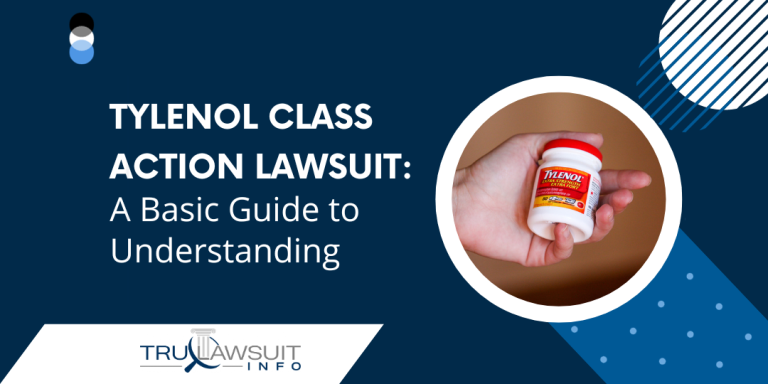
This Tylenol ADHD lawsuit is one of many product liability lawsuits.
This Tylenol lawsuit involves various parties, including plaintiffs who have used the brand’s acetaminophen products during pregnancy, potentially leading to new Tylenol autism cases.
Tylenol Lawyers advocating for their rights are central to these Tylenol autism lawsuits.
Understanding acetaminophen lawsuits, such as Tylenol lawsuits, helps shed light on the potential impact on plaintiffs and the broader implications for manufacturers facing product liability claims of over-the-counter drugs.
This blog aims to provide an overview of the Tylenol class action lawsuit, a case involving brand acetaminophen, exploring its genesis, key players, including plaintiffs and generic acetaminophen manufacturers involved, and its possible ramifications on acetaminophen products.
Table of Contents
Demystifying Class Action Lawsuits: A Focus on Tylenol Cases
Understanding Class Action Lawsuits
Tylenol class action lawsuits are legal actions taken by a group of plaintiffs who have all been affected by the same issue.
These cases often involve multidistrict litigation and require experienced attorneys.
These mass tort cases are typically handled by attorneys in federal district court if they involve plaintiffs from different states, or in state litigation if all plaintiffs reside within the same state.
In relation to mass tort litigation, class action lawsuits, often led by plaintiffs’ attorneys or lawyers, differ in that they deal with many individual claims concerning the same product or event.
Mass torts, like Tylenol lawsuits, usually involve product liability personal injury claims, often leading to litigation where plaintiffs are involved.
The Tylenol Connection
Now, let’s discuss how acetaminophen lawsuit cases relating to acetaminophen use and potential acetaminophen exposure risks fit into this definition, even considering concerns such as acetaminophen autism.
It’s not uncommon for drug manufacturers like Tylenol, known for acetaminophen use, to face Tylenol ADHD class action lawsuits due to potential health risks, such as acetaminophen exposure and acetaminophen autism, associated with their products.
Such litigation is often the result.
For instance, several developmental disorders, such as autism, were linked to acetaminophen use, specifically Tylenol, by pregnant women, leading to potential product liability cases.
This led to a slew of product liability class actions and mass tort litigation against the company, with plaintiffs’ attorneys leading the charge.
In these product liability lawsuits, each of the plaintiffs had used Tylenol, claiming harm as a result of acetaminophen exposure.
Common Misconceptions Debunked
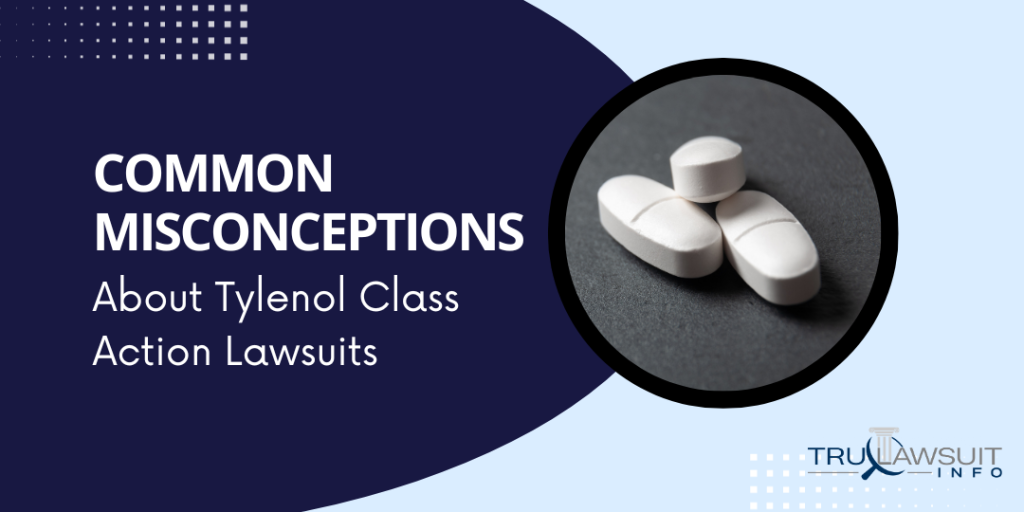
There are plenty of misconceptions floating around about class action claims, litigation cases, and the plaintiffs involved.
One common myth among plaintiffs is that participating in litigation, specifically class action cases is an easy way for lawyers to make money.
However, that’s far from true.
The fact is that these types of litigation cases can take years before lawyers reach any form of settlement for the plaintiffs.
And even then, the risks may not necessarily result in significant financial gain for individual participants, potentially leading to liability issues and litigation cases.
Another misconception is that plaintiffs need proof of purchase or injury to participate in cases like Tylenol lawsuits or other litigation.
But this isn’t always required; it highly depends on the specifics of each court case. One may refer to the page for more details.
The Importance Of Being Informed
Understanding class action lawsuits in relation to Tylenol acetaminophen cases is crucial.
It brings attention to general causation issues often raised by plaintiffs during litigation processes, especially those related to exposure concerns.
Scientific studies and court briefs play a vital role in cases involving plaintiffs and exposure.
Plaintiffs in Tylenol autism lawsuits help establish a link between the drug exposure and the alleged harm, which is necessary for any of these cases.
For instance, in acetaminophen-related Tylenol lawsuits, plaintiffs have used scientific study cases to demonstrate a potential risk and possible correlation between Tylenol use and certain health conditions.
Tylenol Class Action Lawsuit Explained: Key Components
Identification of Key Elements in the Lawsuit
The Tylenol class action lawsuit, like other plaintiffs’ lawsuits, is composed of several key elements.
These cases, often involving acetaminophen use, retain the structure and words of any other legal case.
These include the plaintiffs or those who claim harm in cases like the Tylenol lawsuit, the defendants who are accused of causing such harm—in this case, Johnson & Johnson—and the allegations that form the basis of their dispute in court.
Specifically for these acetaminophen lawsuits, a fact sheet reveals that they revolve around claims that Tylenol caused liver damage to plaintiffs.
These cases involve consumers alleging harm.
The main issue in the Tylenol lawsuit was whether Johnson & Johnson adequately issued a warning to consumers about potential risks and exposure associated with its product, according to the plaintiffs.
How These Components Interact within a Legal Framework
In a class action lawsuit, plaintiffs bring cases of exposure to the motion, interacting within a complex legal framework.
Here’s how:
- Plaintiffs file a complaint outlining their allegations.
- Judges review the Tylenol autism lawsuit and decide if the cases brought by the plaintiffs qualify as a class action.
- If approved, notices are sent out to potential plaintiffs involved in lawsuits, specifically in cases forming part of an MDL.
- The trial involves plaintiffs and lawsuits, where both sides present evidence supporting their cases and defenses.
This process ensures that all plaintiffs and defendants in lawsuits have an opportunity to present their cases.
Role Each Component Plays in Shaping Outcomes
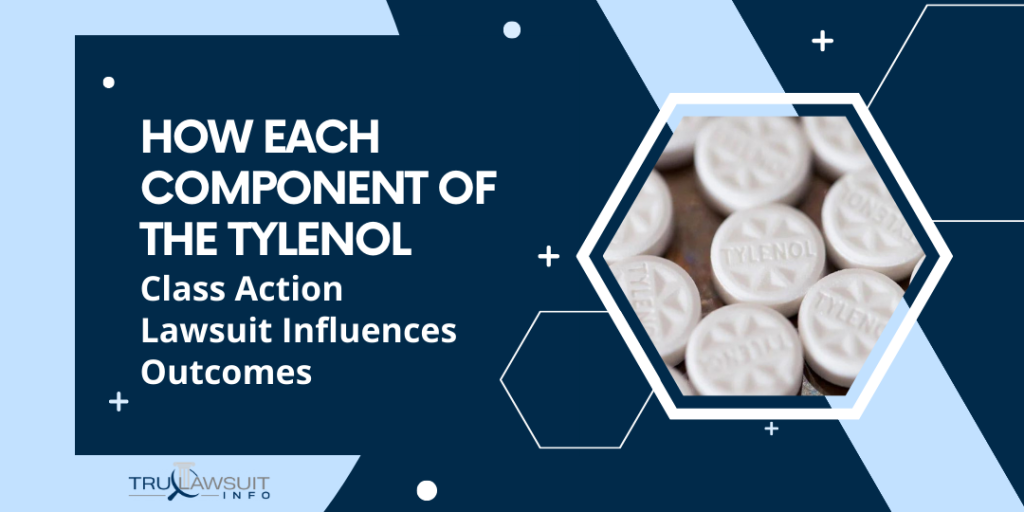
Each component plays a crucial role in shaping outcomes.
For instance, in Tylenol lawsuits, the strength of plaintiffs’ allegations can determine whether they secure compensation for damages suffered.
This has been evident in numerous cases.
On the other hand, how well Johnson & Johnson defends its product in the Tylenol autism lawsuit can influence whether it will be held liable for damages or not.
This applies to all cases, especially those in MDL, where plaintiffs are seeking compensation.
Court decisions in cases at every stage also shape outcomes by determining what evidence is admissible and how laws should be interpreted.
This is particularly evident in the lawsuit where plaintiffs were involved.
Significance of These Components for Plaintiffs and Defendants
These components, including cases, Judge decisions, and MDL use, are significant for both plaintiffs and defendants alike.
For plaintiffs in the acetaminophen lawsuit—those alleging harm—their ability to prove their allegations in the MDL could mean receiving compensation for medical bills or other losses incurred due to alleged liver damage from Tylenol use during pregnancy.
For Johnson & Johnson, successfully defending against the plaintiffs in the Tylenol autism lawsuit is crucial.
A judge’s Decision in this MDL (multi-district litigation) case is highly anticipated.
A loss in the lawsuit could mean not only significant financial damages for the plaintiffs but also a potential blow to their reputation and consumer trust in their products, particularly in cases of MDL related to pregnancy.
Legal Foundations: How Tylenol Class Actions Are Initiated
Lawsuit Initiation Process
Commencing a class action lawsuit against Tylenol concerning the use of acetaminophen presents a challenging undertaking for a presiding judge tasked with managing multidistrict litigation (MDL).
This legal process is imbued with intricate procedural nuances and rigorous prerequisites, within which both the judge and the plaintiffs navigate as part of the MDL proceedings.
Initially, plaintiffs who have experienced analogous harm attributable to the consumption of acetaminophen, specifically Tylenol, must initiate legal action, potentially culminating in the establishment of an MDL.
Within the context of the lawsuit, it falls upon the plaintiffs to substantiate their claims of adverse effects resulting from product usage during pregnancy, a pivotal step in the progression toward MDL adjudication.
Here’s how:
- The first step is filing a complaint.
- Next, they must provide evidence supporting their claim.
- Lastly, the plaintiffs in the lawsuit need to show the judge that numerous other people in the MDL have experienced similar issues.
Legal Requirements for Filing
Before launching into a Tylenol lawsuit, certain prerequisites must be met according to state law.
The plaintiffs must comply with these, and the judge will oversee this process in an MDL setting:
- In the context of an MDL, the number of potential plaintiffs, such as those alleging improper use during pregnancy, should be so large that joining them all in one lawsuit is impractical for a judge.
- The judge should find common questions of law or fact among the plaintiffs in the lawsuit for an MDL class.
- The claims or defenses of the representative parties, typically involved in a lawsuit, are judged in an MDL and are typical of those of the class.
- The representative parties in the MDL lawsuit will fairly and adequately use the judge to protect the interests of the class.
Role of Attorneys
Attorneys play an integral role in this process.
Judges help navigate through these legal waters of lawsuits, which can often seem murky to laymen, especially when dealing with the use of MDL.
- Attorneys gather evidence supporting the allegations made against Tylenol.
- They are responsible for drafting and filing lawsuit complaints on behalf of their clients, under the scrutiny of a judge, utilizing MDL for strategic use.
- Furthermore, they represent their clients during court proceedings, such as a lawsuit or MDL, ensuring their best interests are served.
- They use their expertise to judge the best course of action.
Potential Challenges During Initiation
The road to initiating a Tylenol class action lawsuit, particularly involving pregnancy, can be fraught with challenges, requiring the use of a seasoned judge.
One major hurdle in the acetaminophen lawsuit could be proving that all plaintiffs were harmed by Tylenol in a similar way – this is crucial for establishing a ‘class’ in the MDL, as the judge would need to determine.
Another potential challenge in the acetaminophen lawsuit could lie in the MDL, finding sufficient evidence linking Tylenol directly to any adverse effects suffered by plaintiffs during pregnancy.
Lastly, resistance from strong defense teams fielded by big corporations like Johnson & Johnson, the makers of Tylenol, an acetaminophen product, can make the process of a pregnancy-related lawsuit even more daunting, especially in the context of MDL (multidistrict litigation).
Class Certification Criteria: Is Your Tylenol Case Eligible?
Criteria for Inclusion in the Lawsuit
The eligibility for inclusion in the acetaminophen lawsuit, specifically the class action lawsuit against Tylenol, is determined by specific criteria set by the MDL judge.
These include factors such as proof of purchase, evidence of harm or injury from acetaminophen, and confirmation that Tylenol was indeed the cause of the lawsuit.
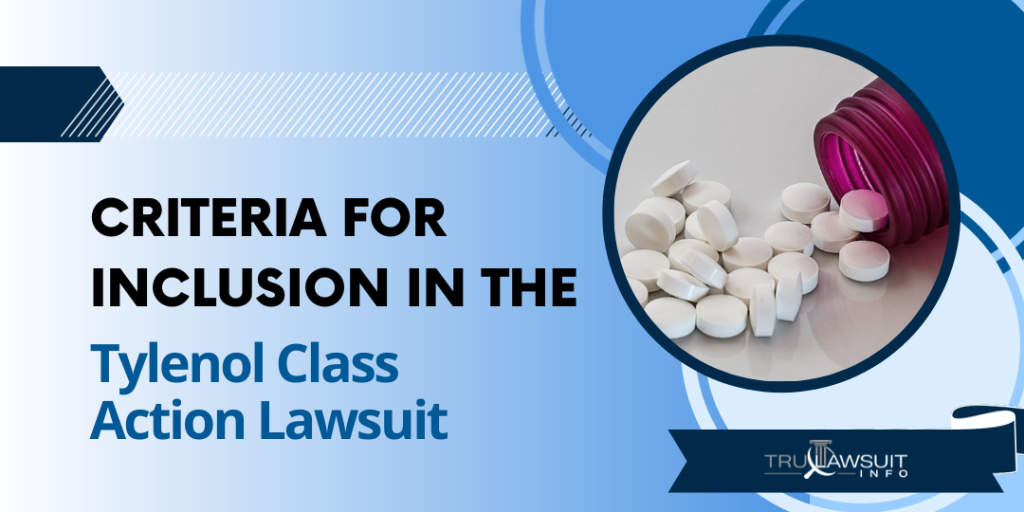
The MDL judge will consider the following:
- Proof of Purchase: You must have receipts or other forms of evidence showing you bought Tylenol, the acetaminophen product in question, for the lawsuit.
- Evidence of Harm: In an acetaminophen lawsuit, the judge in the MDL (multidistrict litigation) requires medical records indicating you suffered health issues after using Tylenol.
- Cause Confirmation: In the acetaminophen lawsuit, it’s crucial to prove your injuries were directly caused by Tylenol under the scrutiny of the MDL judge.
Representing the Class: The Role of Lead Plaintiffs
Duties and Responsibilities of Lead Plaintiffs
In a multidistrict litigation (MDL) like the Tylenol ADHD class action lawsuit involving acetaminophen use, lead plaintiffs carry significant responsibilities, as determined by the judge.
They represent the collective group filing an acetaminophen lawsuit against Johnson & Johnson, Tylenol’s parent company, under the supervision of an MDL judge.
Their duties as a judge in an MDL include providing expert testimony on autism, working closely with lawyers to build a strong civil case involving Tylenol, and making decisions that will impact the overall lawsuit.
Selection Process for Lead Plaintiffs
The selection process for new plaintiffs is not random.
The MDL lawsuit involving autism requires a judge’s careful consideration of qualifications and potential conflicts of interest.
Tylenol autism lawyers from reputable law firms typically nominate individuals, such as those impacted by autism, who have suffered significantly due to the defendant’s actions in a lawsuit.
The judge and the MDL are crucial parts of this process.
The federal court judge then reviews these lawsuit nominations related to autism and Tylenol before selecting the lead plaintiff.
Relationship Between Lead Plaintiffs and Other Members
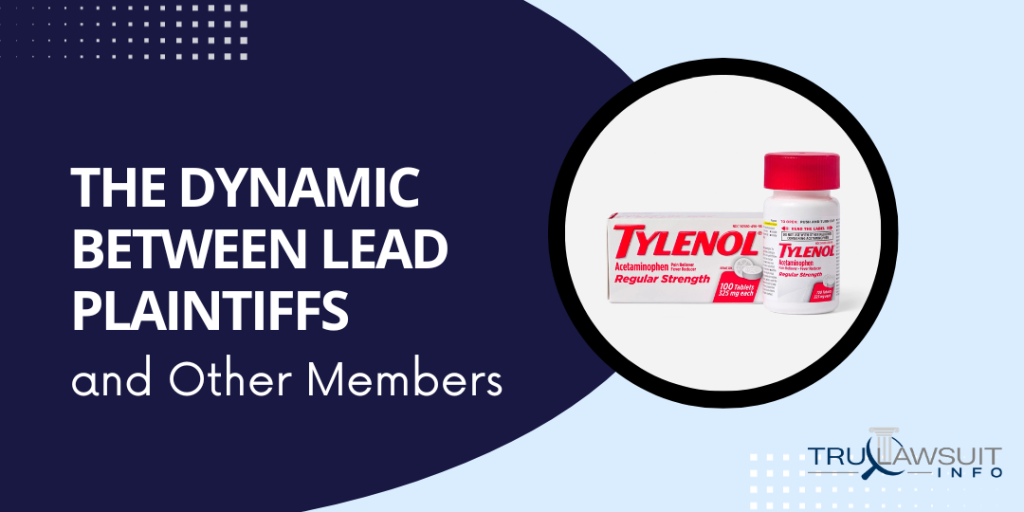
Lead plaintiffs in an autism-related Tylenol lawsuit do not operate in isolation; they maintain a close relationship with other members within their class action group, under the scrutiny of a judge.
This relationship between the judge and parties in the autism-related lawsuit is crucial as it facilitates information exchange about developments, like the potential role of Tylenol and acetaminophen, ensuring that all members are kept abreast of these updates.
Impact of Lead Plaintiffs’ Decisions on The Lawsuit
The decisions made by lead plaintiffs in a Tylenol autism lawsuit can significantly influence the course of a class-action suit, particularly when autism and acetaminophen are central issues.
For instance, their choice to accept or reject settlement offers related to autism and Tylenol, or specifically acetaminophen, directly affects all claimants involved in the lawsuit.
Settlements vs. Trials: Options in Tylenol Class Actions
Understanding Settlement and Trial Options
When you’re part of a class action lawsuit, like the Tylenol acetaminophen one, there are two roads you can take – settlement or trial.
This could be relevant to autism research.
A settlement is where the defendant (in this case, Tylenol, an acetaminophen product) offers to pay a certain amount to avoid going to court, possibly in relation to autism claims.
This amount is known as the settlement value.
On the other hand, a trial involving autism and Tylenol presents your case before a judge or jury, who will then decide on the outcome.
It’s important to note that choosing between options like autism, acetaminophen, and Tylenol isn’t as straightforward as it seems.
Factors Influencing The Choice
A lot goes into deciding whether to settle for Tylenol, go for a trial with acetaminophen, or consider the autism angle.
These factors, including the use of Tylenol, potential autism risks, acetaminophen dosage, time constraints, and even public opinion, influence the strength of your case and settlement value.
For instance, if you have solid evidence against the use of acetaminophen (Tylenol) and its potential link to autism, and believe that you can win more than what’s offered in the settlement, you might opt for a trial.
However, trials on acetaminophen, like Tylenol for autism, can be lengthy and stressful, so some may prefer settling.
Pros and Cons For Plaintiffs
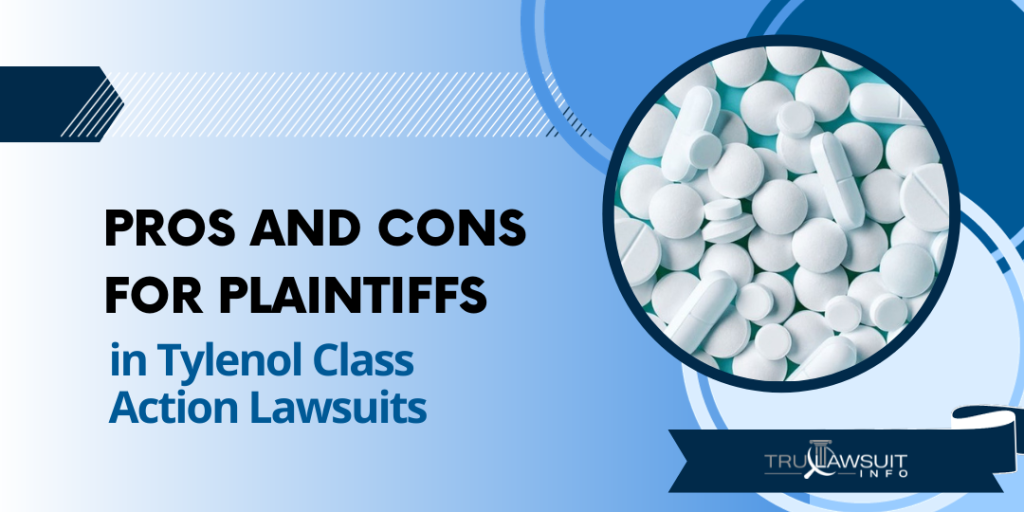
Settlements:
- Pros: Quick resolution, guaranteed compensation.
- Cons: May receive less Tylenol than what could have been won at trial, impacting autism and acetaminophen studies.
Trials:
- Pros: Potential for higher compensation.
- Cons: No guarantee of winning; lengthy process; stressful experience.
It’s crucial that plaintiffs weigh the pros and cons of acetaminophen and Tylenol autism carefully before making their collective decisions.
Role Of Legal Counsel In Decision Making
Legal counsel plays an integral role in guiding the decision-making process regarding autism and the use of acetaminophen like Tylenol.
They provide advice on autism and acetaminophen use, including Tylenol, based on their expertise in law and understanding of your specific situation.
For example, they would assess whether your case involving Tylenol and autism, potentially linked to acetaminophen, has enough merit to win at trial or if accepting a global settlement would be more beneficial.
They can also help negotiate a higher settlement value if they believe the initial offer for the Tylenol and autism-related acetaminophen case is too low.
Navigating the Legal Process: Steps in a Tylenol Class Action Lawsuit
Class action lawsuits, such as the one against Tylenol’s acetaminophen and its potential link to autism, follow specific steps.
Understanding the link between autism, acetaminophen (Tylenol), and their importance can help you navigate the legal process.
Outline of Steps Involved
The first step is filing a form complaint in state court regarding Tylenol, autism, and acetaminophen.
This document outlines your grievances against Tylenol.
It’s crucial to be as detailed as possible here.
The complaint will include information about how you believe Tylenol, an acetaminophen product, may have contributed to autism.
You’ll also need to provide any relevant medical records at this stage, including those related to acetaminophen or Tylenol autism.
Next comes the discovery plan.
This is where all parties involved share information that’s pertinent to the autism case, including data on Tylenol and acetaminophen.
Here are some instances:
- Each party researching autism and acetaminophen has an opportunity to gather evidence from others.
- In researching autism and its potential links to Tylenol or acetaminophen, it’s essential to be thorough during discovery; every piece of evidence can potentially strengthen your case.
After discovery, there may be an interlocutory appeal.
Interlocutory appeals happen when one party, perhaps concerned about Tylenol, autism, or acetaminophen, disagrees with a decision made by the court during proceedings but before final judgment.
Autism symptoms are not common in every case, but they can be a significant hurdle if they arise, possibly linked to Tylenol or acetaminophen use.
Having competent legal representation can make navigating interlocutory appeals related to acetaminophen, specifically Tylenol, and autism cases much easier.
Importance of Each Step
Each step in this process carries its weight and plays a vital role in ensuring justice is served in autism-related cases.
The form complaint about Tylenol, autism, and acetaminophen sets the tone for your Tylenol autism lawsuit; it’s your first chance to present your side of the story.
The discovery plan regarding the autism and acetaminophen study allows both sides to gather evidence and prepare their arguments about Tylenol usage fully.
A discovery plan concerning autism and Tylenol, specifically acetaminophen, can significantly influence the outcome of a trial or settlement negotiations.
Interlocutory appeals in autism cases involving Tylenol or acetaminophen are crucial because they allow for errors or disputes about legal procedures to be addressed immediately, rather than after the final judgment has been delivered.
Overcoming Challenges at Each Stage
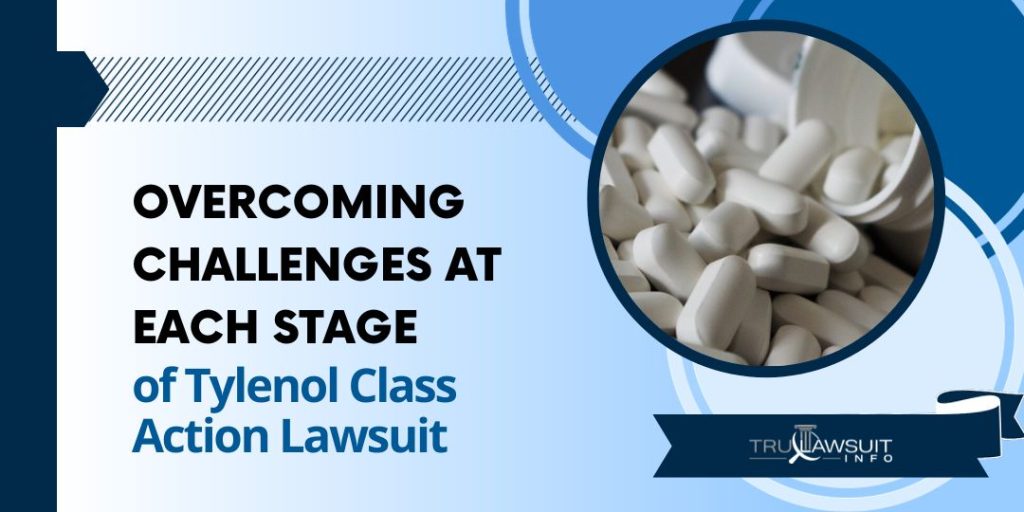
Facing challenges at each stage is inevitable in any Tylenol class action lawsuit, whether it’s related to autism, Tylenol, or acetaminophen.
However, understanding potential problems like autism possibly linked to acetaminophen (Tylenol) and having strategies to overcome them can make the process smoother.
The autism-related acetaminophen (Tylenol) complaint stage requires careful attention to detail and thoroughness.
It’s crucial not to rush this step; take your time to gather all necessary information about autism, Tylenol, and acetaminophen.
During the discovery of links between autism and acetaminophen, being proactive in gathering evidence about Tylenol usage and cooperating with other parties is key.
If a legal debate about Tylenol or acetaminophen and its potential link to autism arises, having experienced legal representation can help ensure your interests are protected.
Tylenol Class Action Lawsuit: Role of Legal Representation
Having competent legal representation throughout these steps is crucial.
They will guide you through each stage of understanding autism, helping you comprehend what’s happening when using Tylenol or acetaminophen and what to expect next.
Your lawyer will also advocate for your rights and interests during negotiations or at trial, whether it involves Tylenol, acetaminophen, or autism-related cases.
They’re an invaluable resource when navigating complex legal processes like acetaminophen or autism-related Tylenol class action lawsuit ADHD.
Remember, every case is unique.
Tylenol, often used for pain relief, may work for one person but not another, just like autism treatments.
The effects of acetaminophen vary as well.
However, understanding the basics of the acetaminophen process can give you a solid foundation as you navigate your own Tylenol and autism class action lawsuit journey.
Recent Developments in Tylenol Class Action Lawsuits
An Update on Tylenol Lawsuits
The legal landscape surrounding Tylenol lawsuits is ever-evolving.
Recently, new cases have emerged, adding to the ongoing litigations against the makers of Tylenol, a widely used over-the-counter drug containing acetaminophen, in relation to autism.
Plaintiffs in these lawsuits argue that Tylenol and other generic acetaminophen products pose serious health risks, including potential links to autism.
They allege that prenatal exposure to drugs like acetaminophen or Tylenol can lead to autism or ADHD (attention deficit hyperactivity disorder) in children.
Implications for Current Plaintiffs and Future Lawsuits
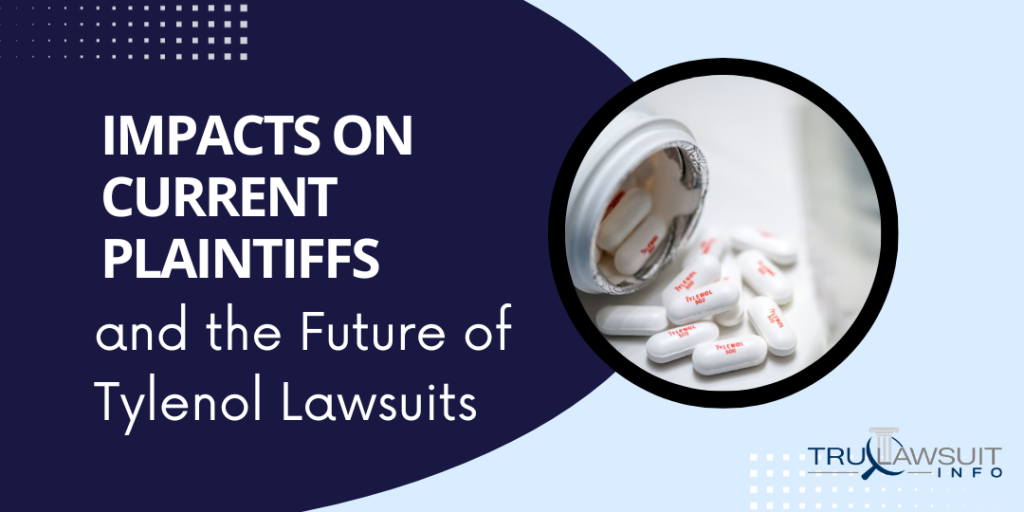
These developments in autism and acetaminophen, specifically Tylenol, could significantly impact both current plaintiffs and future lawsuits.
As more people, including those with autism, come forward with claims, it may strengthen the case against the manufacturers of Tylenol and generic acetaminophen products.
However, this surge in litigation also presents challenges.
The volume of cases involving autism and Tylenol, or acetaminophen, could potentially slow down proceedings or complicate settlements.
Consumer Rights and Safety Regulations
The rise in Tylenol autism lawsuits involving the drug acetaminophen underscores a broader issue concerning consumer rights and safety regulations for over-the-counter drugs.
These cases underscore the need for more transparency from drug manufacturers, like those producing acetaminophen and Tylenol, about potential health risks associated with their products, including autism.
Furthermore, they raise questions about whether existing regulations on autism, acetaminophen, and Tylenol are sufficient to protect consumers.
If these lawsuits concerning acetaminophen result in significant settlements or verdicts against the manufacturers, it could prompt regulatory bodies to reevaluate their guidelines for over-the-counter drugs like Tylenol, especially in relation to autism.
Legal Expert Analysis
Legal experts closely monitor these developments as they unfold.
Their analysis provides valuable insights into how these changes might shape future litigation trends regarding over-the-counter drugs like Tylenol, which contains Acetaminophen, and potential links to Autism.
Some experts suggest that if lawsuits against Tylenol and other acetaminophen manufacturers are successful, these could set a precedent for similar claims, possibly even those related to autism, against other over-the-counter drug manufacturers.
Others caution that each case of autism potentially linked to Tylenol or acetaminophen use is unique and must be evaluated on its own merits.
The Significance of Tylenol Class Actions in Consumer Rights
Shaping Consumer Protection Laws
Class actions, such as the Tylenol lawsuit involving acetaminophen, play a significant role in shaping consumer protection laws, including those related to autism.
Particularly for pharmaceutical companies like Johnson & Johnson, the parent company of Tylenol, a well-known acetaminophen product, these lawsuits, some potentially linked to autism, serve as a wake-up call.
They highlight the need for stricter regulations and transparency.
For instance, the Tylenol class action lawsuit, involving acetaminophen, brought to light issues of product liability, federal preemption, and potential links to autism.
Ripple Effects on Industry Standards
Successful suits regarding autism and Tylenol, specifically acetaminophen, can trigger ripple effects across industry standards for product safety disclosures.
When a corporation like Tylenol is held accountable for its negligence or misconduct related to autism, it sends a powerful message to other players in the industry.
The issue of autism and Tylenol sets new precedents that force companies to reassess their own practices.
This was evident in the aftermath of the Tylenol autism lawsuit involving acetaminophen, where there was a marked improvement in safety disclosures across pharmaceutical companies, including those related to autism.
Leveraging Collective Power
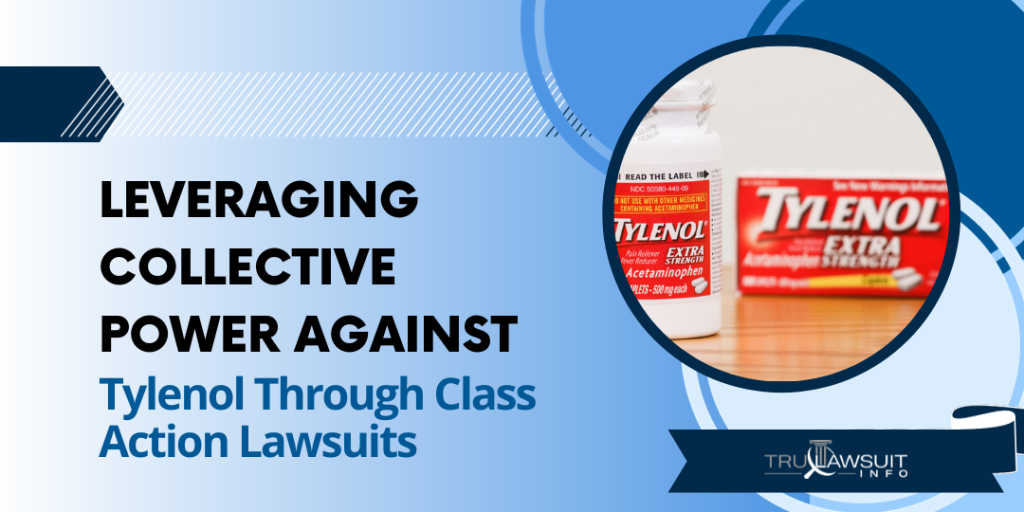
Consumers can leverage their collective power through class action lawsuits, such as those involving Tylenol, acetaminophen, and autism.
These lawsuits, involving acetaminophen and Tylenol, allow consumers to band together and demand accountability from corporations, particularly in autism-related cases.
In cases like the Tylenol lawsuit, where acetaminophen and autism were central issues, this collective power proved instrumental in bringing about change.
The Tylenol issue served as a reminder that corporations, even those producing widely used acetaminophen, cannot ignore their responsibilities towards consumers, including those with autism, without facing repercussions.
Reflections on Past Successes or Failures
Past successes or failures with autism and Tylenol have profound implications for future similar cases.
They act as guidelines, helping courts navigate complex legal terrains while deciding on similar issues related to autism.
For example, the success of the Tylenol class action lawsuit has set precedents that could potentially influence outcomes of future cases involving product liability and consumer rights, including those related to autism.
However, failures in legal strategies regarding autism and Tylenol usage provide valuable lessons by highlighting areas where consumer protection laws might require amendments.
To wrap up,
The significance of class actions like the Tylenol lawsuit, especially in the context of autism, cannot be overstated.
They shape consumer protection laws related to autism and Tylenol, influence industry standards, and empower consumers to demand accountability.
Moreover, they provide valuable lessons for future cases.
In essence, these lawsuits, like those involving Tylenol and autism, serve as a checks-and-balances mechanism that ensures corporations uphold their responsibilities towards consumers.
They remind us of the power of collective action in autism and the importance of standing up for consumer rights, especially when it comes to products like Tylenol.
Compensation and Remedies in Tylenol Class Action Lawsuits
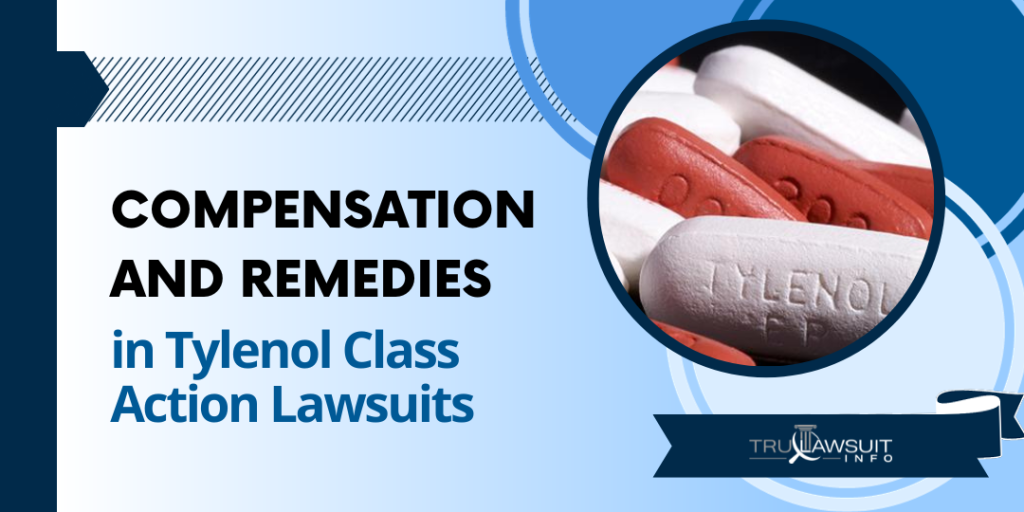
The intricacies of autism-related Tylenol class action lawsuits can be complex to grasp, but understanding the fundamentals is essential.
Such knowledge about autism and Tylenol empowers consumers to recognize their rights and take appropriate action when necessary.
These lawsuits, including those concerning Tylenol and autism, have played a significant role in shaping consumer rights, especially regarding product safety.
They provide a platform for consumers with autism who have suffered similar harm from Tylenol products to seek justice collectively.
For anyone considering joining a Tylenol class action, especially those related to autism, it’s crucial to understand the legal process involved, the autism-related criteria for class certification, and the potential remedies available.
A clear comprehension of these aspects, in relation to autism and Tylenol, will help you make informed decisions about your participation in such suits.
For further information or assistance with autism-related Tylenol class action lawsuits, consider consulting with legal professionals knowledgeable in this field.
Frequently Asked Questions
-
What is a Tylenol Class Action Lawsuit?
An autism-related Tylenol class action lawsuit is a type of legal claim filed by one person or a small group on behalf of others who have suffered similar harm from using Tylenol or acetaminophen products, potentially linked to autism.
-
How is a Class Action Lawsuit Initiated?
A class-action lawsuit is initiated when an individual or small group files a claim on behalf of others who have experienced similar damages due to the same cause, such as autism potentially linked to Tylenol use.
-
What Role Does the Lead Plaintiff Play?
The lead plaintiff, representing the interests of all members in the Tylenol-related class action lawsuit, works closely with lawyers throughout the litigation process, which includes concerns about autism.
-
What Are My Options if I am Part of a Tylenol Class Action Settlement?
If you are part of a Tylenol settlement, you may receive compensation without going to trial or opt out and pursue individual legal actions if you believe it would result in higher compensation.
-
How Can I Determine If My Tylenol Case Is Eligible for Class Certification?
To determine eligibility for Tylenol class certification, consult with an attorney who can assess whether your Tylenol case meets the necessary criteria, which typically include numerosity, commonality, typicality, and adequacy of representation.

Experienced Attorney & Legal SaaS CEO
With over 25 years of legal experience, Jessie is an Illinois lawyer, a CPA, and a mother of three. She spent the first decade of her career working as an international tax attorney at Deloitte.
In 2009, Jessie co-founded her own law firm with her husband – which has scaled to over 30 employees since its conception.
In 2016, Jessie founded TruLaw, which allows her to collaborate with attorneys and legal experts across the United States on a daily basis. This hypervaluable network of experts is what enables her to share reliable legal information with her readers!
Have A Case?
Here, at Tru Lawsuit Info, we’re committed to helping victims get the justice they deserve.
To do this, we actively work to connect them with attorneys who are experts in litigating cases similar to theirs.
Would you like our help?
Tru Lawsuit Info is a reliable source of information about issues that may affect your health and safety, such as faulty products, data breaches, and environmental hazards.
Our team of experienced writers collaborates with medical professionals, lawyers, and advocates to produce informative articles, guides, and other resources that raise awareness of these topics.
Our thorough research provides consumers with access to reliable information and updates on lawsuits happening around the country. We also can connect consumers with attorneys if they need assistance.
Camp Lejeune's water contamination issue spanned several decades starting in the 1950s. Exposure to these chemicals has been linked to various serious health issues, including cancer, organ diseases, and death.
Research is increasingly suggesting a link between the use of Tylenol during pregnancy and the development of neurodevelopmental disorders, such as autism and ADHD, in infants.
Legal action is being taken against manufacturers of Aqueous Film-Forming Foam (AFFF), a chemical used in fighting fires. The plaintiffs allege that exposure to the foam caused health issues such as cancer, organ damage, and birth and fertility issues.
Have A Case?
Here, at Tru Lawsuit Info, we’re committed to helping victims get the justice they deserve.
To do this, we actively work to connect them with attorneys who are experts in litigating cases similar to theirs.
Would you like our help?







